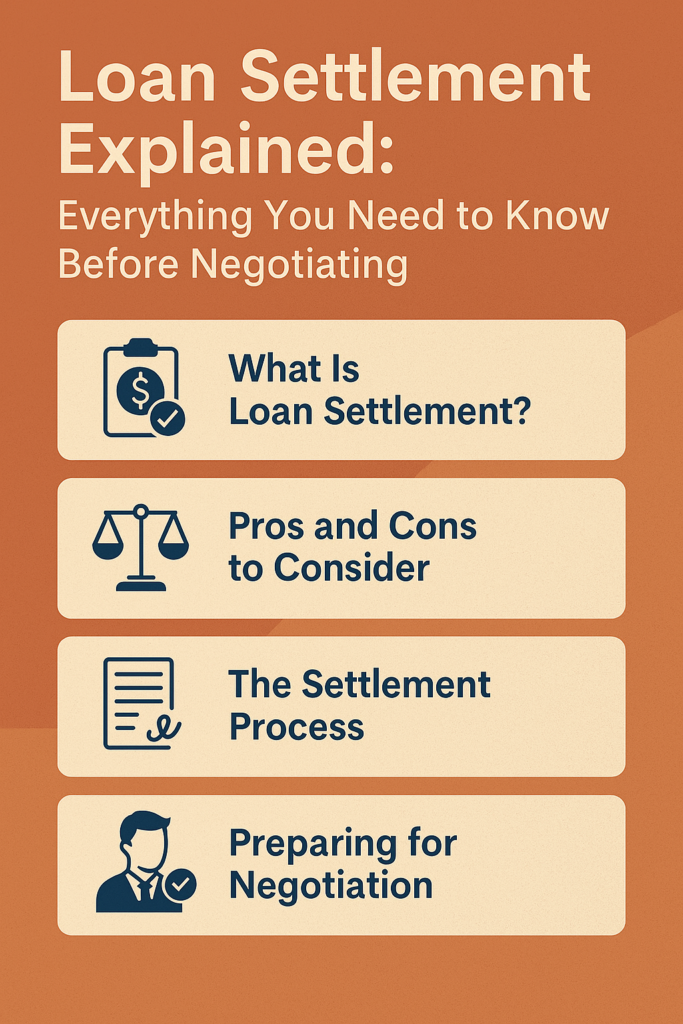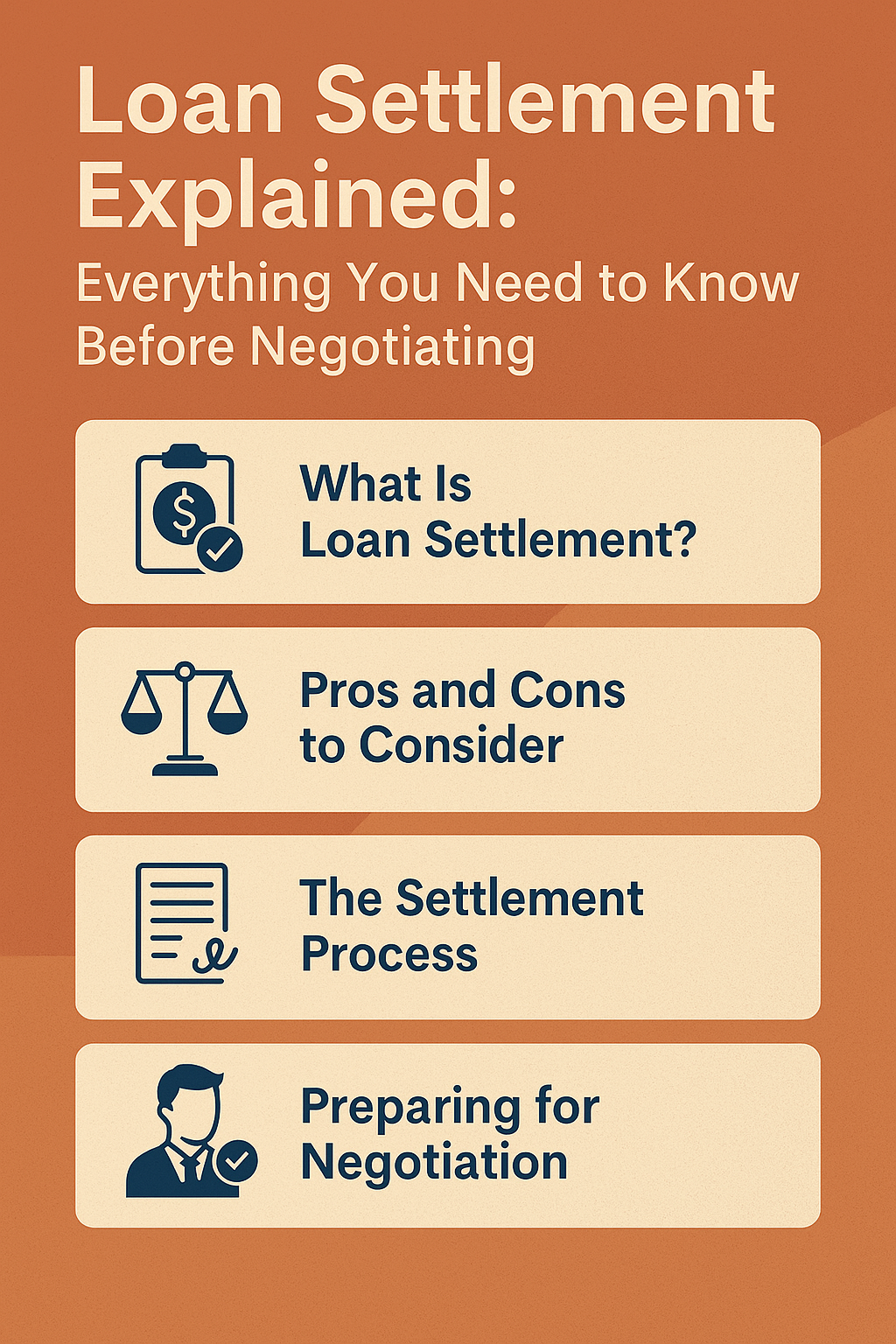InIntroduction
Loan settlement is an option for borrowers struggling with debt, allowing them to negotiate with lenders to pay a reduced amount instead of the full outstanding balance. This can be a helpful strategy for individuals facing financial hardship due to unforeseen circumstances such as job loss, medical emergencies, or economic downturns. However, before opting for this process, it is crucial to understand how it works, its pros and cons, and the negotiation process.
In this guide, we will explain loan settlements, how they impact your credit score, and how to negotiate the best deal. If you are considering this option, Guardian Financial Experts is here to help.

What is Loan Settlement?
A loan settlement is a process where a borrower negotiates with the lender to pay a reduced lump sum amount instead of the total outstanding debt. This helps the lender recover a portion of the loan while allowing the borrower to close the debt without paying the full amount.
How Does it Works?
- The borrower faces financial hardship and is unable to continue loan payments.
- The lender agrees to negotiate after assessing the borrower’s financial situation.
- A lump sum amount is decided, usually lower than the outstanding loan amount.
- The borrower makes the payment, and the lender marks the loan as “settled.”
- The loan is closed, but the borrower’s credit report reflects a “settled” status.
Note: A “settled” status is different from a “closed” status. A settlement means partial repayment, whereas a closed loan means full repayment.
When Should You Consider Debt Settlement?
Not everyone qualifies for a settlement. Here are some situations where it might be a suitable option:
- Financial Hardship: Due to job loss, medical expenses, or other financial crises.
- Excessive Debt Burden: If loan repayment is becoming unmanageable.
- Legal or Recovery Agency Harassment: If banks or collection agencies are aggressively pursuing repayment.
- Prolonged Defaults: If you have missed multiple EMI payments and have no option to restructure your loan.
Steps to Negotiate Successfully for Settlement
Step 1: Analyze Your Financial Condition
Before approaching the lender, assess your finances and determine how much you can afford to pay as part of the settlement.
Step 2: Contact the Lender
Reach out to your lender and explain your financial difficulties. Banks and financial institutions may offer solutions if they see no chance of full recovery.
Step 3: Negotiate the Best Deal
Lenders usually settle for 40-70% of the outstanding amount. Try to negotiate the lowest possible amount to reduce your financial burden.
Step 4: Get the Agreement in Writing
Once the terms are finalized, ensure you receive a written settlement agreement that clearly states:
- The agreed amount
- The due date for payment
- Confirmation that the loan will be marked as “settled” after payment
Step 5: Make the Payment & Obtain a No-Dues Certificate
Once the amount is paid, request a No-Dues Certificate (NDC) from the lender as proof that you have no further obligations.
Step 6: Check Your Credit Report
This process affects your credit score. After settlement, check your credit report to ensure it is correctly marked and plan for rebuilding your credit. Learn more about Credit Score Builder services.
Pros and Cons of Settlement
Pros
✅ Debt Relief: Allows you to close a loan at a reduced amount. ✅ Prevents Legal Action: Helps avoid lawsuits and recovery agency harassment. ✅ Financial Stability: Reduces immediate financial burden and stress.
Cons
❌ Credit Score Impact: Can reduce your CIBIL score by 50-100 points. ❌ Future Loan Rejections: Lenders may reject future loan applications due to past settlements. ❌ Tax Implications: The waived amount may be taxable as per Indian tax laws.
Alternatives to Consider
If you’re worried about credit score damage, consider these alternatives:
- Loan Restructuring: Request the lender to extend tenure or reduce interest rates.
- Debt Consolidation: Combine multiple loans into a single loan with a lower interest rate. Read more about Debt Consolidation.
- Refinancing: Take a new loan to pay off the existing one with better terms.
How Guardian Financial Experts Can Help
At Guardian Financial Experts, we specialize in financial recovery and debt management. Our experts assist in:
- Negotiating with lenders for the best possible deals.
- Providing legal assistance to ensure proper documentation.
- Helping rebuild your credit score post-settlement.
- Offering financial planning to avoid future debt problems.
Conclusion
Settling a loan is a practical solution for individuals facing financial distress, but it comes with consequences. Before opting for this route, explore alternative options like loan restructuring or debt consolidation. If you decide to proceed, negotiate wisely and document every step.
For expert guidance, contact Guardian Financial Experts today. Visit our website: www.guardianfinancialexperts.com and take the first step towards financial freedom!
Need Help? Get expert advice from Guardian Financial Experts today! 🚀

